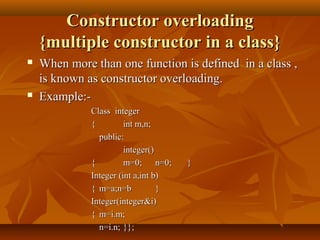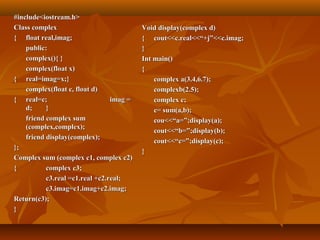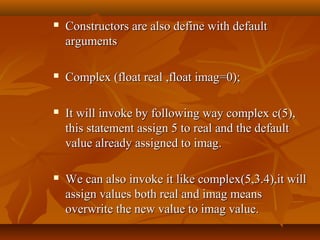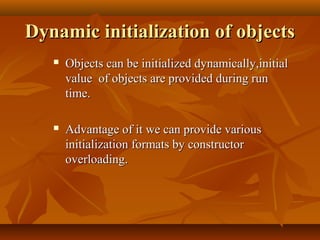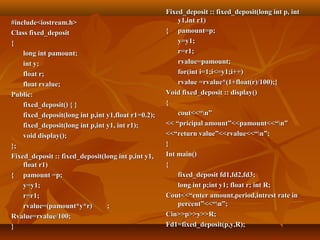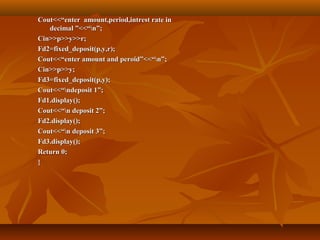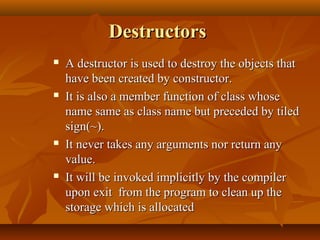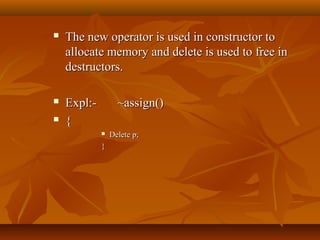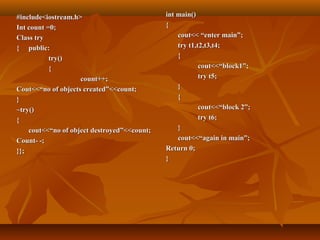This document discusses classes and objects in C++. It defines a class as a user-defined data type that implements an abstract object by combining data members and member functions. Data members are called data fields and member functions are called methods. An abstract data type separates logical properties from implementation details and supports data abstraction, encapsulation, and hiding. Common examples of abstract data types include Boolean, integer, array, stack, queue, and tree structures. The document goes on to describe class definitions, access specifiers, static members, and how to define and access class members and methods.
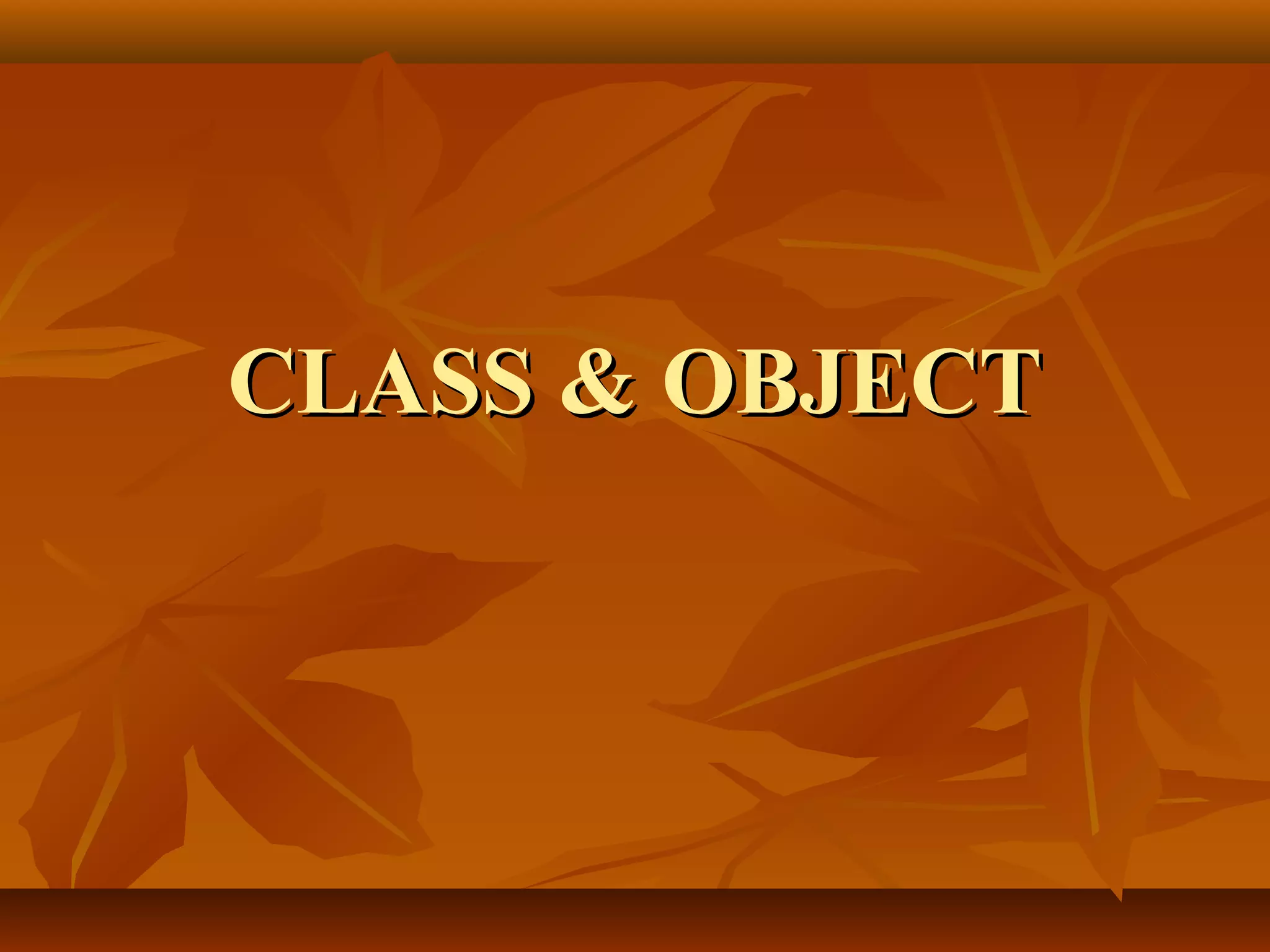
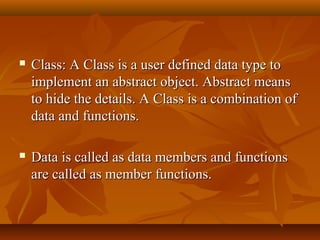
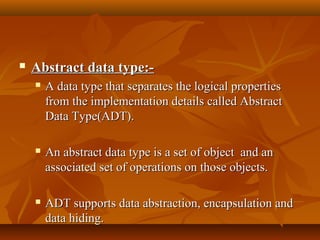
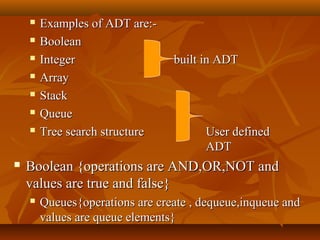
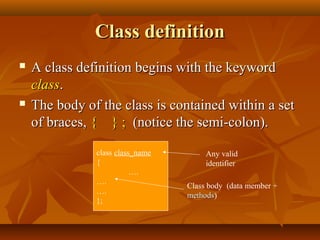
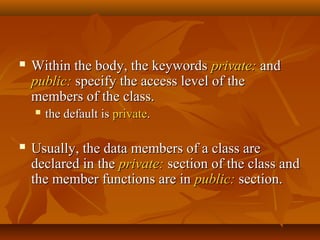
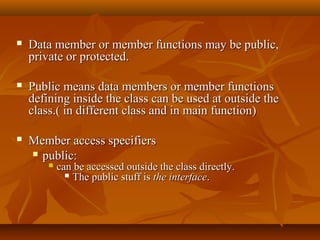
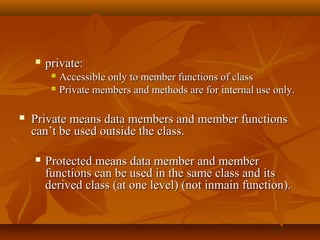
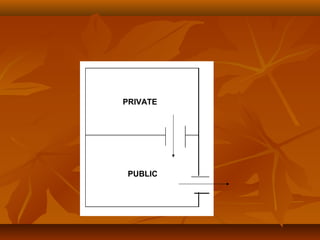
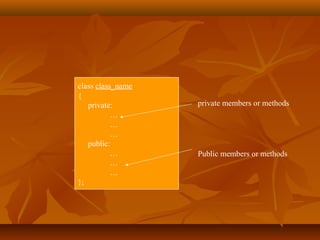
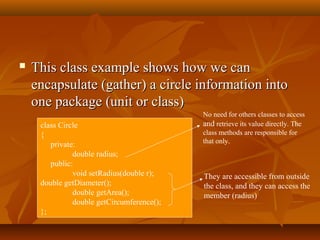
![Class Example (Problem)Class Example (Problem)
#include<iostream.h>#include<iostream.h>
#include<stdio.h>#include<stdio.h>
class studentclass student
{{
int rollno;int rollno;
char name[20];char name[20];
};};
void main()void main()
{{
student s;student s;
cout<<“enter the rollno.:”;cout<<“enter the rollno.:”;
cin>>s.rollno;cin>>s.rollno;
cout<<“enter the name:”;cout<<“enter the name:”;
gets(s.name);gets(s.name);
cout<<“rollno:”<<s.rollno;cout<<“rollno:”<<s.rollno;
cout<<“nname:”;cout<<“nname:”;
puts(s.name);puts(s.name);
}}](https://image.slidesharecdn.com/classandobjectunit2-150824133722-lva1-app6891/85/Class-and-object-in-C-12-320.jpg)
![Class Example (Solution)Class Example (Solution)
#include<iostream.h>#include<iostream.h>
#include<stdio.h>#include<stdio.h>
class studentclass student
{{
public:public:
int rollno;int rollno;
char name[20];char name[20];
};};
void main()void main()
{{
student s;student s;
cout<<“enter the rollno.:”;cout<<“enter the rollno.:”;
cin>>s.rollno;cin>>s.rollno;
cout<<“enter the name:”;cout<<“enter the name:”;
gets(s.name);gets(s.name);
cout<<“rollno:”<<s.rollno;cout<<“rollno:”<<s.rollno;
cout<<“nname:”;cout<<“nname:”;
puts(s.name);puts(s.name);
}}](https://image.slidesharecdn.com/classandobjectunit2-150824133722-lva1-app6891/85/Class-and-object-in-C-13-320.jpg)
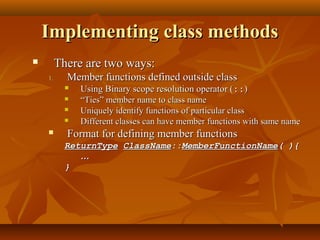
![Member FunctionMember Function
Defining Inside the ClassDefining Inside the Class
#include<iostream.h>#include<iostream.h>
#include<stdio.h>#include<stdio.h>
class studentclass student
{{
int rollno;int rollno;
char name[20];char name[20];
public:public:
void getdata()void getdata()
{{
cout<<“enter the rollno.:”;cout<<“enter the rollno.:”;
cin>>rollno;cin>>rollno;
cout<<“enter the name:”;cout<<“enter the name:”;
gets(name);gets(name);
}}
void putdata()void putdata()
{{
cout<<“rollno:”<<rollno;cout<<“rollno:”<<rollno;
cout<<“nname:”;cout<<“nname:”;
puts(name);puts(name);
}}
};};
void main()void main()
{{
student s;student s;
s.getdata();s.getdata();
s.putdata();s.putdata();
}}
Data Members (Private : in this example)
Member Functions (Public: in this example)
Calling member function](https://image.slidesharecdn.com/classandobjectunit2-150824133722-lva1-app6891/85/Class-and-object-in-C-15-320.jpg)
![Member FunctionMember Function
Defining Outside the ClassDefining Outside the Class
#include<iostream.h>#include<iostream.h>
#include<stdio.h>#include<stdio.h>
class studentclass student
{{
int rollno;int rollno;
char name[20];char name[20];
public:public:
void getdata();void getdata();
void putdata();void putdata();
};};
void student :: getdata()void student :: getdata()
{{
cout<<“enter the rollno.:”;cout<<“enter the rollno.:”;
cin>>rollno;cin>>rollno;
cout<<“enter the name:”;cout<<“enter the name:”;
gets(name);gets(name);
}}
void student: :: putdata()void student: :: putdata()
{{
cout<<“rollno:”<<rollno;cout<<“rollno:”<<rollno;
cout<<“nname:”;cout<<“nname:”;
puts(name);puts(name);
}}
void main()void main()
{{
student s;student s;
s.getdata();s.getdata();
s.putdata();s.putdata();
}}](https://image.slidesharecdn.com/classandobjectunit2-150824133722-lva1-app6891/85/Class-and-object-in-C-16-320.jpg)
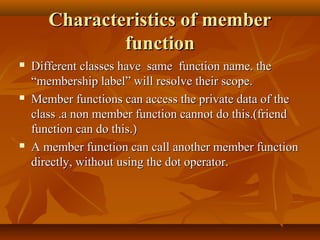
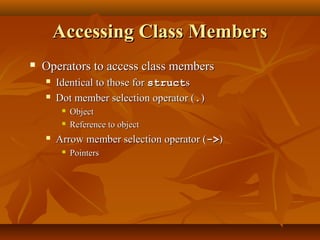
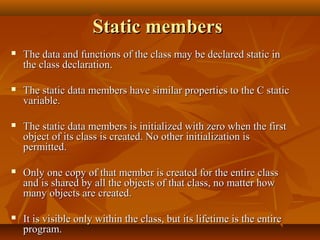
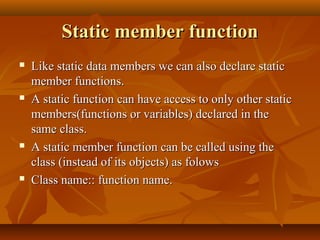
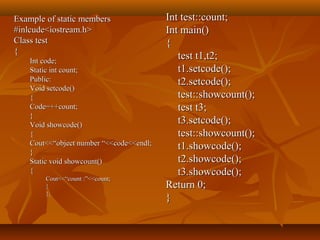
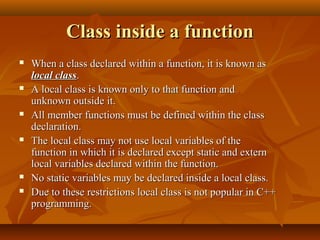
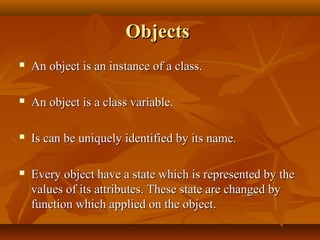
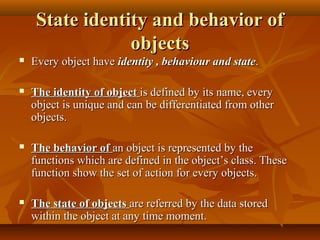
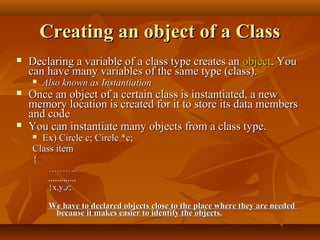
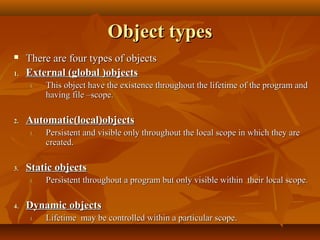
![Memory Allocation of ObjectMemory Allocation of Object
class studentclass student
{{
int rollno;int rollno;
char name[20];char name[20];
int marks;int marks;
};};
student s;student s;
rollno – 2 bytes
name- 20 bytes
marks- 2 bytes
24 bytes s](https://image.slidesharecdn.com/classandobjectunit2-150824133722-lva1-app6891/85/Class-and-object-in-C-27-320.jpg)
![Array of objectsArray of objects
The array of class type variable is known as array ofThe array of class type variable is known as array of
object.object.
We can declare array of object as following way:-We can declare array of object as following way:-
Class _name object [length];Class _name object [length];
Employee manager[3];Employee manager[3];
1.1. We can use this array when calling a member functionWe can use this array when calling a member function
2.2. Manager[i].put data();Manager[i].put data();
3.3. The array of object is stored in memory as a multi-The array of object is stored in memory as a multi-
dimensional array.dimensional array.](https://image.slidesharecdn.com/classandobjectunit2-150824133722-lva1-app6891/85/Class-and-object-in-C-28-320.jpg)
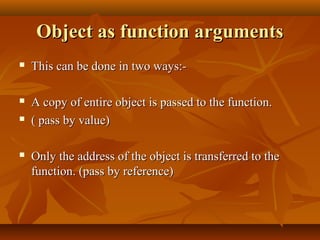
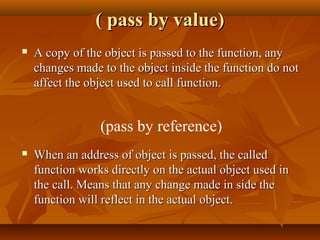
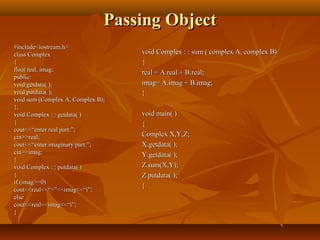
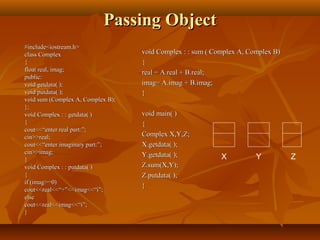
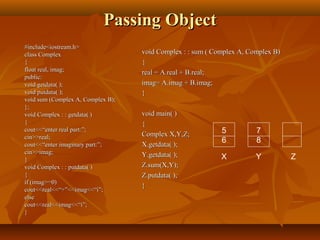
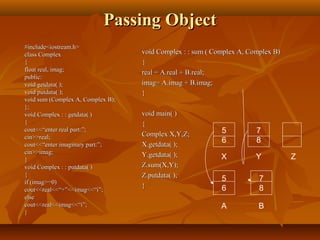
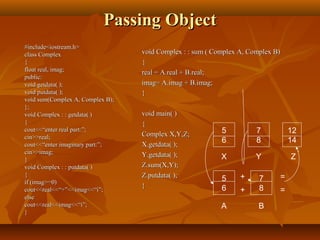
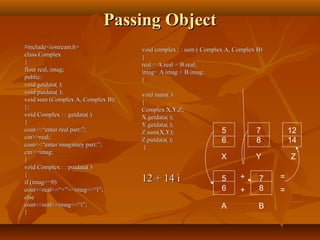
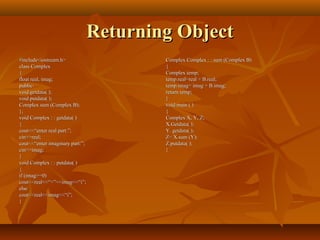
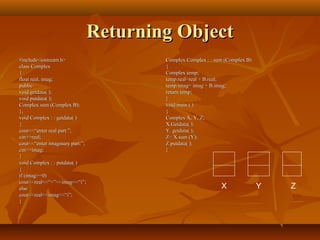
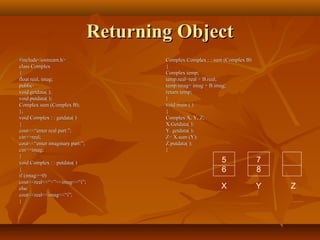
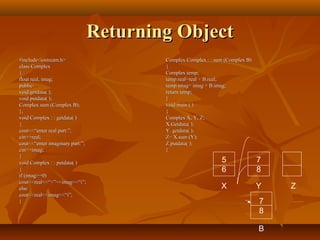
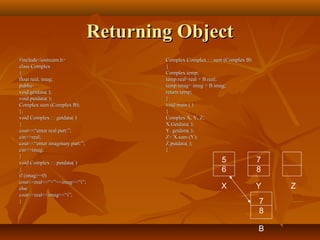
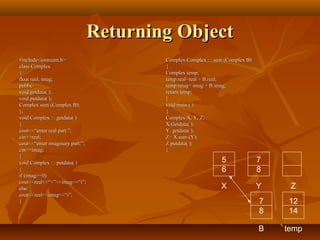
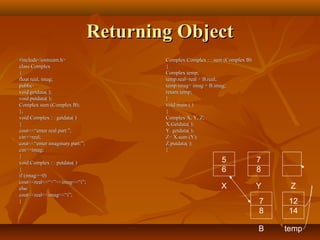
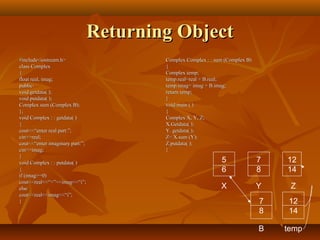
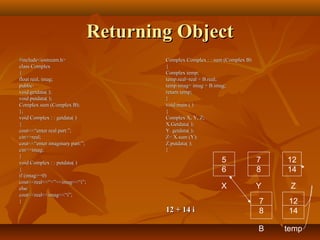
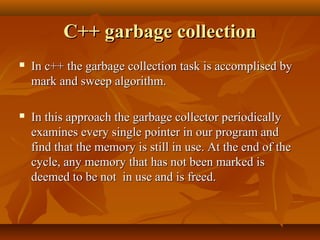
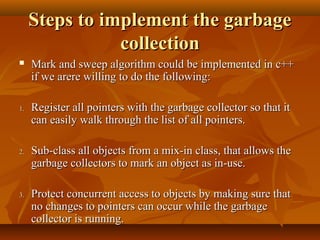
![Memory management in c++Memory management in c++
Ways of memory allocation in c++Ways of memory allocation in c++
Static memory allocationStatic memory allocation
The memory allocation for variables ,during compilation timeThe memory allocation for variables ,during compilation time
itself is known as static memory allocation.itself is known as static memory allocation.
Once the memory allocated at the compile time then it can notOnce the memory allocated at the compile time then it can not
be expanded nor be compressed to accommodate more or lessbe expanded nor be compressed to accommodate more or less
data during program execution.data during program execution.
The size of memory to be allocated is known before compileThe size of memory to be allocated is known before compile
time and is fixed it can not be altered during execution.time and is fixed it can not be altered during execution.
Int a[10];Int a[10];](https://image.slidesharecdn.com/classandobjectunit2-150824133722-lva1-app6891/85/Class-and-object-in-C-48-320.jpg)
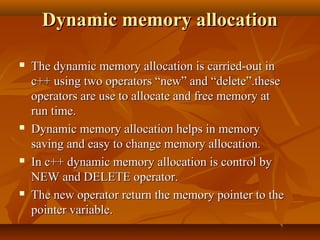
![ Syntax:Syntax:
Ptr= new data type;Ptr= new data type;
Delete Ptr;Delete Ptr;
Ptr is pointer and data type is valid data typePtr is pointer and data type is valid data type
The difference between NEW and malloc function is thatThe difference between NEW and malloc function is that
NEW automatically calculates the size of operand , dos notNEW automatically calculates the size of operand , dos not
use size of operator and NEW does not require an explicituse size of operator and NEW does not require an explicit
type cast.type cast.
Versions of NEW and DELETEVersions of NEW and DELETE
in c++ NEW and DELTE should be used like malloc and free toin c++ NEW and DELTE should be used like malloc and free to
ensure the proper calling of constuctor and destructor for theensure the proper calling of constuctor and destructor for the
classes.classes.
Both have two versionsBoth have two versions
1.1. NEW and DeleteNEW and Delete
2.2. NEW[] and DELETE []NEW[] and DELETE []
First two are for pointers to single objects, and last two forFirst two are for pointers to single objects, and last two for
arrays of objects.arrays of objects.](https://image.slidesharecdn.com/classandobjectunit2-150824133722-lva1-app6891/85/Class-and-object-in-C-50-320.jpg)
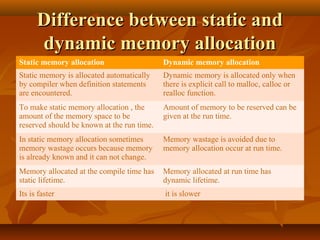
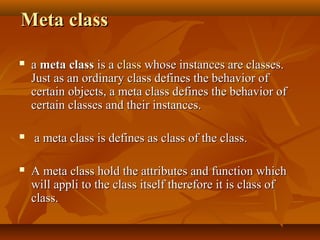
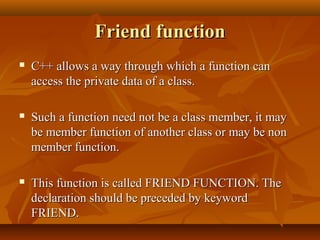
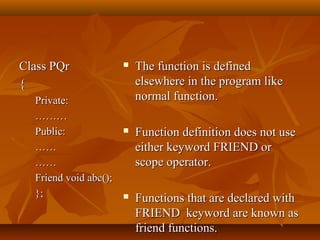
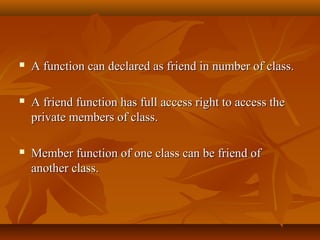
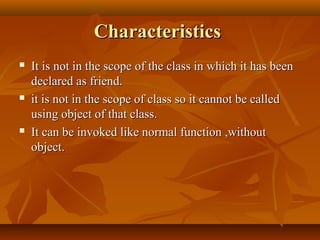
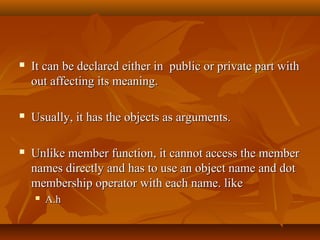
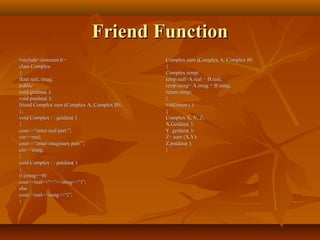
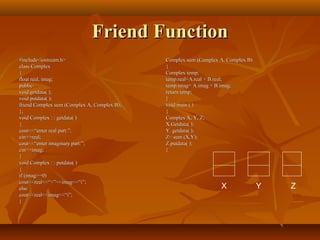
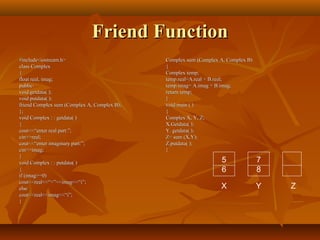
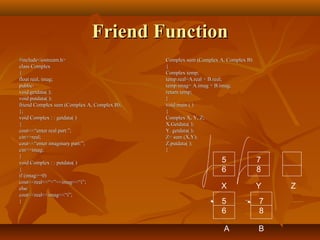
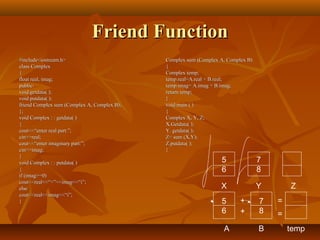
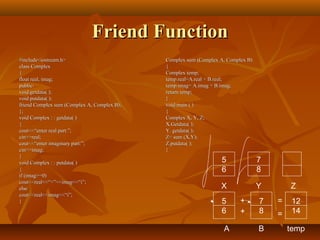
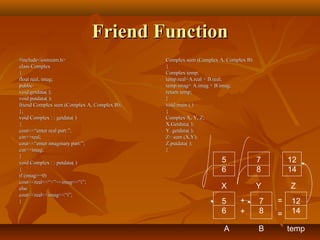
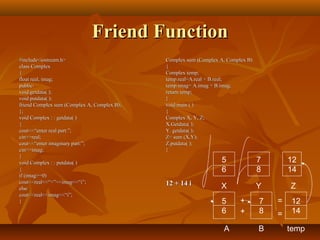
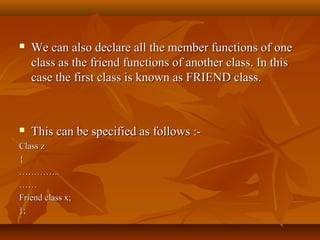
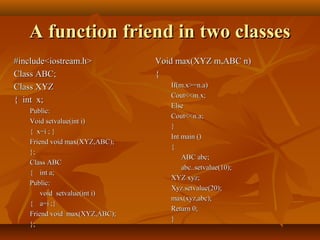
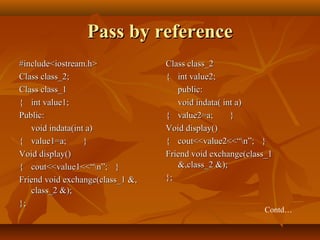
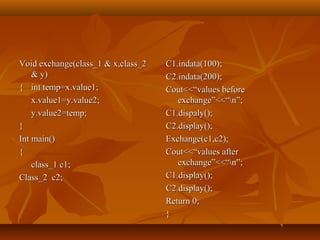
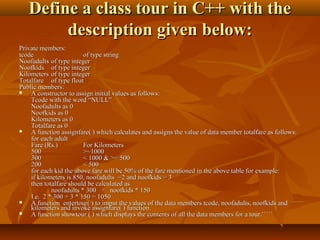
![class tourclass tour
{{
char tcode[15];char tcode[15];
int noofadults;int noofadults;
int noofkids;int noofkids;
int kilometers;int kilometers;
float totalfare;float totalfare;
public:public:
tour( )tour( )
{{
strcpy(tcode,”null”);strcpy(tcode,”null”);
noofadults=0;noofadults=0;
noofkids=0;noofkids=0;
kilometers=0;kilometers=0;
totalfare=0;totalfare=0;
}}
void assignfare( )void assignfare( )
{{
if (kilometers>=1000)if (kilometers>=1000)
totalfare= 500 * noofadults + 250 *totalfare= 500 * noofadults + 250 *
noofkids;noofkids;
else if (kilometers>=500)else if (kilometers>=500)
totalfare= 300 * noofadults + 150 *totalfare= 300 * noofadults + 150 *
noofkids;noofkids;
elseelse
totalfare= 200 * noofadults + 100 *totalfare= 200 * noofadults + 100 *
noofkids;noofkids;
}}
void entertour( )void entertour( )
{{
cout<<“enter tcode:”;cout<<“enter tcode:”;
gets(tcode);gets(tcode);
cout<<“enter noofadults:”;cout<<“enter noofadults:”;
cin>>noofadults;cin>>noofadults;
cout<<“enter noofkids:”;cout<<“enter noofkids:”;
cin>>noofkids;cin>>noofkids;
cout<<“enter kilometers=“;cout<<“enter kilometers=“;
cin>>kilometers;cin>>kilometers;
}}
void showtour ( )void showtour ( )
{{
cout<<“tcode=“<<tcode;cout<<“tcode=“<<tcode;
cout<<“nnumber ofcout<<“nnumber of
adults=“<<noofadults;adults=“<<noofadults;
cout<<“nnumber of kids=“<<noofkids;cout<<“nnumber of kids=“<<noofkids;
cout<<“nkilometers=“<<kilometers;cout<<“nkilometers=“<<kilometers;
cout<<“ntotalfare=“<<totalfare;cout<<“ntotalfare=“<<totalfare;
}}
};};](https://image.slidesharecdn.com/classandobjectunit2-150824133722-lva1-app6891/85/Class-and-object-in-C-71-320.jpg)
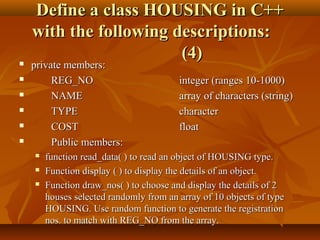
![class HOUSINGclass HOUSING
{{
int REG_NO;int REG_NO;
char NAME[20], TYPE;char NAME[20], TYPE;
float COST;float COST;
public:public:
void read_data( )void read_data( )
{{
cout<<“Enter Registration Number=“;cout<<“Enter Registration Number=“;
cin>>REG_NO;cin>>REG_NO;
cout<<“Enter Name=“;cout<<“Enter Name=“;
gets(NAME);gets(NAME);
cout<<“Enter Type=“;cout<<“Enter Type=“;
cin>> TYPE;cin>> TYPE;
cout<<“Enter Cost=“;cout<<“Enter Cost=“;
cin>>COST;cin>>COST;
}}
void display ( )void display ( )
{{
cout<<“Registration No.”<<REG_NO;cout<<“Registration No.”<<REG_NO;
cout<<“nName=“;cout<<“nName=“;
puts(NAME);puts(NAME);
cout<<“nType=“<<TYPE;cout<<“nType=“<<TYPE;
cout<<“nCost=“<<COST;cout<<“nCost=“<<COST;
}}
void draw_nos( )void draw_nos( )
{{
int no1, no2;int no1, no2;
randomize( );randomize( );
no1=random(1991)+10;no1=random(1991)+10;
no2=random(1991)+10;no2=random(1991)+10;
for (int i=0; i<10; i++)for (int i=0; i<10; i++)
if (arr[i].REG_NO==no1|| arr[i].REG_NO==no2)if (arr[i].REG_NO==no1|| arr[i].REG_NO==no2)
display();display();
}}
};};
HOUSING arr[10];HOUSING arr[10];](https://image.slidesharecdn.com/classandobjectunit2-150824133722-lva1-app6891/85/Class-and-object-in-C-73-320.jpg)
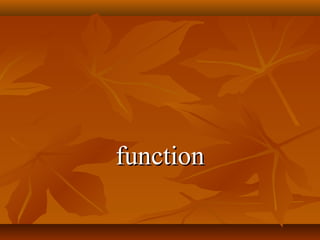
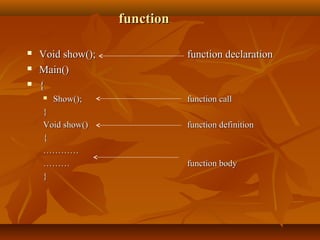
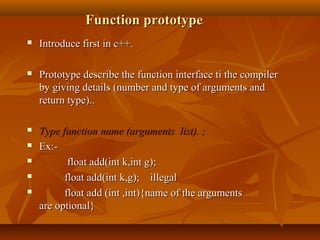
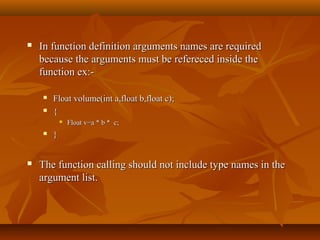
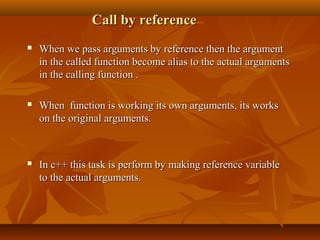
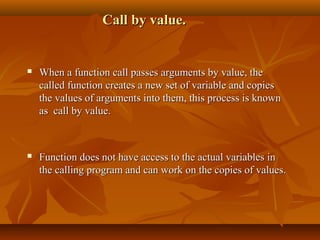
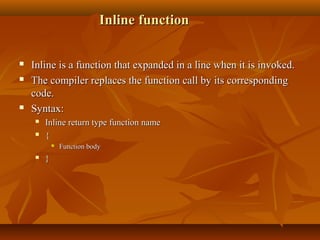
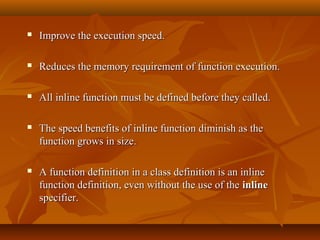
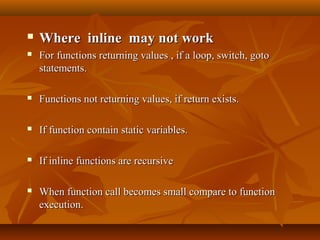
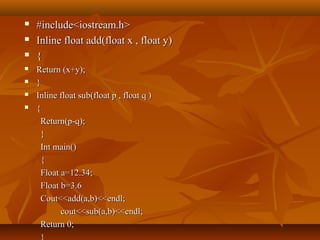
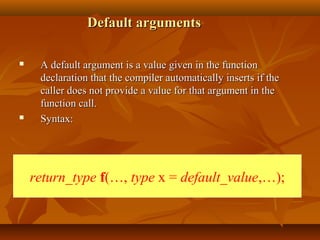
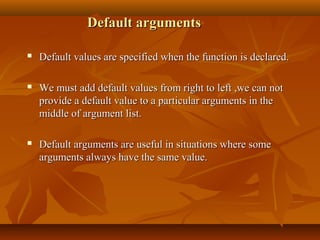
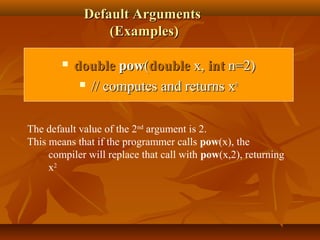
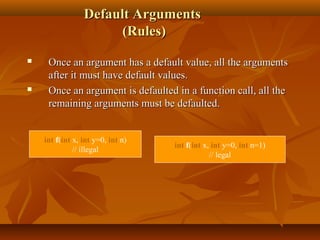
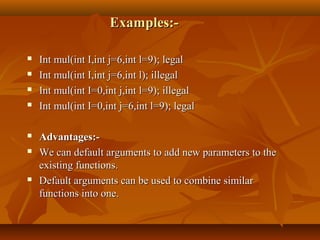
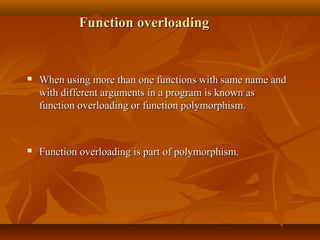
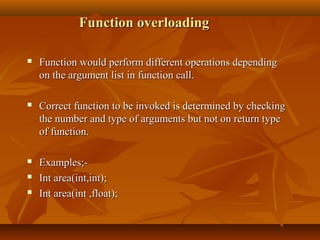
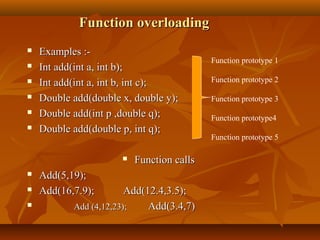
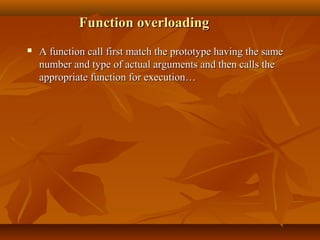
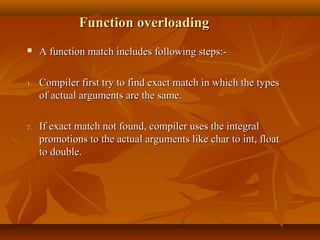
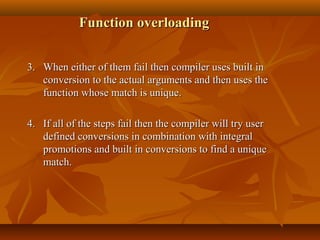

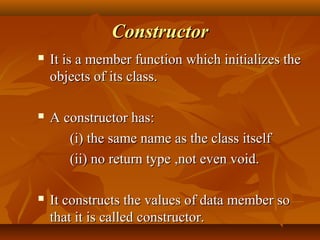
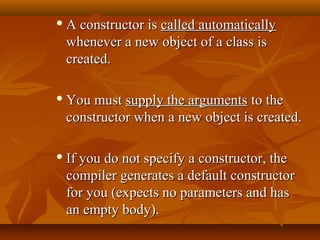
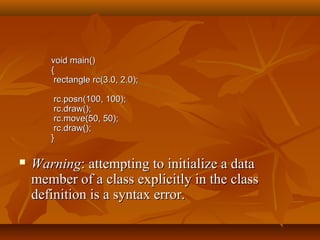
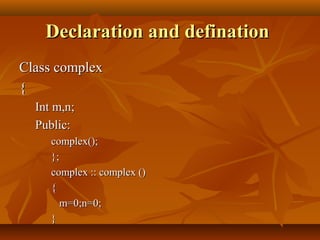
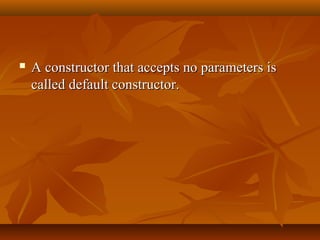
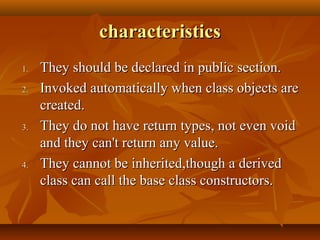
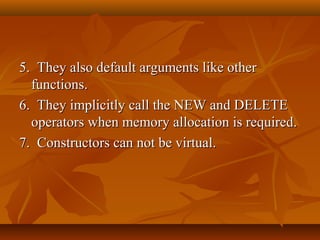
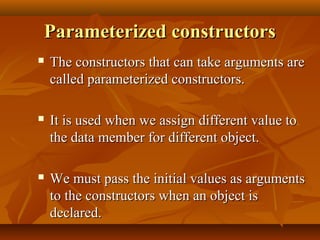
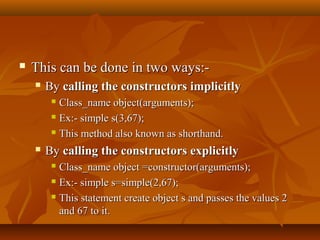
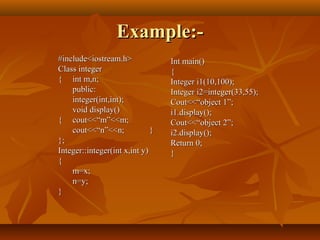
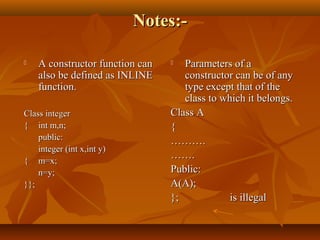
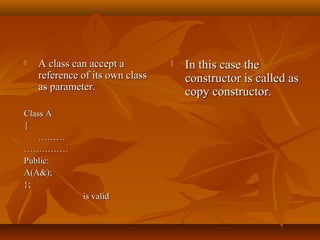
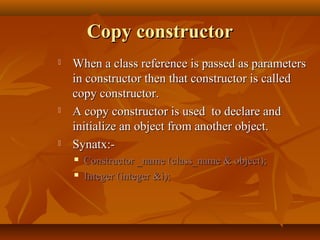
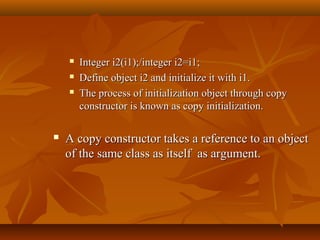
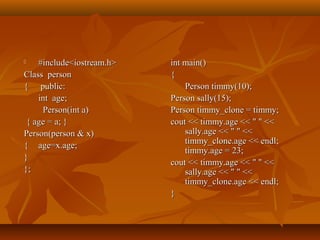
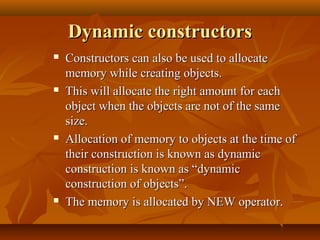
![#include<iostream.h>#include<iostream.h>
#include<string.h>#include<string.h>
Class stringClass string
{{
char *name;char *name;
int length;int length;
Public:Public:
string()string()
{{
length =0;length =0;
name = newchar[length+1];name = newchar[length+1];
}}
string(char *s)string(char *s)
{{
length=strlen(s);length=strlen(s);
name=new char [length+1];name=new char [length+1];
strcpy(name,s );strcpy(name,s );
}}
Void display()Void display()
{{ cout<<name<<“n”;}cout<<name<<“n”;}
void join (string &a,string & b);void join (string &a,string & b);
};};
void string:: join(striing&a,string &b)void string:: join(striing&a,string &b)
{{ length =a.length+b.length;length =a.length+b.length;
delete name;delete name;
name =new char [length+1];name =new char [length+1];
strcpy(name,a.name);strcpy(name,a.name);
strcpy(name,b.name);strcpy(name,b.name);
}}
Int main()Int main()
{{ char *first =“jon”;char *first =“jon”;
string name1(first),name2(tom),name3(jery),s1,s2;string name1(first),name2(tom),name3(jery),s1,s2;
s1.join(name1.name2);s1.join(name1.name2);
s2.join(s1,name3);s2.join(s1,name3);
name1.display();name1.display();
name2.display();name2.display();
name3.display();name3.display();
s1.display();s1.display();
s2.display();s2.display();
return 0;return 0;
}}](https://image.slidesharecdn.com/classandobjectunit2-150824133722-lva1-app6891/85/Class-and-object-in-C-112-320.jpg)
